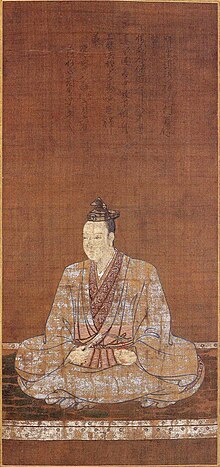
Back Akechi Mitsuhide Catalan Micuhide Akeči Czech Akechi Mitsuhide German Akechi Mitsuhide Esperanto Akechi Mitsuhide Spanish آکچی میتسوهیده Persian Akechi Mitsuhide Finnish Akechi Mitsuhide French אקצ'י מיטסוהידה HE Akecsi Micuhide Hungarian
Akechi Mitsuhide (明智 光秀, March 10, 1528 – July 2, 1582),[1] first called Jūbei from his clan and later Koretō Hyūga no Kami (惟任日向守) from his title, was a Japanese samurai general of the Sengoku period. Mitsuhide was originally a bodyguard of Ashikaga Yoshiaki and later, one of the trusted generals under daimyō Oda Nobunaga during his war of political unification in Japan.
Mitsuhide rebelled against Nobunaga for unknown reasons in the Honnō-ji Incident in 1582, forcing the unprotected Nobunaga to commit seppuku in Kyoto.
Mitsuhide attempted to establish himself as shōgun, but was pursued by Nobunaga's successor Toyotomi Hideyoshi and defeated at the Battle of Yamazaki. The 13-days short reign of Mitsuhide is listed as the inspiration for the yojijukugo set phrase mikkatenka (三日天下, short-lived[2] reign).[3][4]
He is still popular in present culture. A ceremonial activity was held on April 15, 2018, in Kyoto.[5]
- ^ Turnbull, Stephen (1998). The Samurai Sourcebook. Cassell & Co. p. 212. ISBN 1854095234.
- ^ According to the Sanseido reference, 三日 should be understood not literally as three days, but as "ごく短い期間", e.g. an exceptionally short period of time
- ^ "三日天下" [Mikkatenka]. 広辞苑第六版 (Koujien, 6th edition) (in Japanese). 株式会社岩波書店 (Iwanami Shoten, Inc.). 2008.
- ^ 三日天下 [Mikkatenka]. 新明解四字熟語時点 (Shinmeika Yojijukugo Jiten) (in Japanese). 三省堂(Sanseidō). Retrieved 5 Sep 2013.
- ^ "「逆臣」光秀の善政たどる 京都・福知山で15日催し : 京都新聞". Archived from the original on 2018-04-13. Retrieved 2018-04-13.
© MMXXIII Rich X Search. We shall prevail. All rights reserved. Rich X Search
